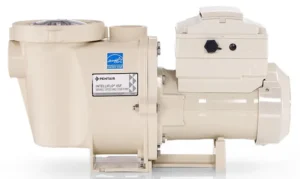90
How the Pool Pump Law Changes Affect Your Pool

Remember the 100-watt light bulb? We will be saying the same thing about 2 horsepower pool pumps in the very near future.
On average, the pool pump is the second-largest energy consumer in a home behind the HVAC system(s). It is not surprising that pool pumps have been added to the U.S. Department of Energy’s list for minimum energy efficiency standards like refrigerators, washers, and dryers. There is a big change to pool pump production guidelines that begin July 2021. Although, most manufacturers have already moved to adapt to these new guidelines.
What are these changes?
Single-speed pool pumps above 1 horsepower will no longer be manufactured and sold. Any water demands greater than what a 1 HP pump can provide, will have to been done with a variable speed pump that can typically operate anywhere from a fraction of horsepower up to 3 HP. These new changes are also cleaning up some labeling requirements, so most pump manufacturers are opting to just go with those two options only for inground pool pumps. A 1 HP single speed pump or a variable speed pump will be your only two pump choices.
What does this mean for pool owners?
Nothing, until your pool pump goes out. When that day occurs, prepare to purchase an entirely new pump. Pumps can be fixed, but it might not be cost-effective to replace the motor and wet end components to match different HP ratings. However, you could also look at it as a good thing that ends up saving you a lot of money on energy costs. If your pool pump is only used for water circulation and you don’t have any high-water demand features like a spa or big waterfall, then a 1 HP pump is all you need. If you have a 2 HP pump now, then that 1 HP pump is going to cost you roughly half as much to operate. If you do have those higher water demand features, then a variable speed pump can provide that extra water when needed and still operate at a lower speed for the daily filter cycle. This will also dramatically reduce your energy costs when using this method. If the pump does need to be replaced it may pay for itself in a relatively short time frame with those big energy bill savings.
Currently, pool pumps are still in short supply due to delays in production and increased demand associated with the pandemic, along with the Texas winter storm and subsequent power outage damage. At this time, we would not recommend replacing a working pump. There are a few things you can do to prolong its life:
- Preserve the airflow moving around the electric motor by eliminating weeds, leaves, or other debris from building up near the pump.
- Keep ants or other insects from trying to use it as a home.
- Divert falling water from the roof onto the pump, along with making sure the equipment area has adequate drainage to keep the pump from flooding.




